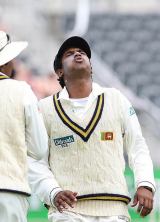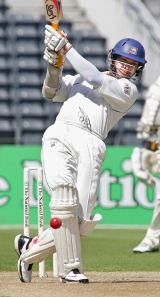Being positive isn't always about hitting everything
The need to find a better balance between strokemaking and leaving
13-Dec-2006
|
|

|
Traditionally, Sri Lanka teams have fared poorly in New Zealand with only Arjuna Ranatunga's team in the mid-1990's winning a Test match. The unfamiliar weather and vastly different conditions to what we are used to back home have made it difficult. But coming into this series, after our recent upturn in form and with a side full of talented young players, we arrived confident that we could provide a strong challenge. The result of the first Test therefore had us all bitterly disappointed.
As tours have become shorter, touring teams have had to learn how to adapt faster to alien conditions. This is the same for us now as it is for teams visiting Asia. You have to undergo a crash course in acclimatisation and it is not easy, especially since we no longer play two to three practice games before the Tests. But coming into the first Test, at Christchurch, we tried to fast-track our process of adjustment - our own games and mental processes - and did not preoccupy ourselves with the uncontrollables like the conditions.
We had just the one practice game, against Otago in Dunedin, and it all went to plan. The Otago side was a reasonable opposition and the batting line-up performed solidly while the bowlers did a fantastic job on what was a flat pitch. Practice had been good, the attitude had been right and we strode into the opening Test full of confidence.
Our decision at the toss has attracted quite a lot of media attention, but while we knew the pitch was going to offer a little extra to the seamers for the first session and a half we also knew that getting runs in the first innings, even a modest score of around 250, would have set us up really well because in the final innings we had Muralitharan to lead the attack. Mahela Jayawardene had no hesitation in batting first. As it turned out, a total of around 250 would indeed have set us up nicely.
However, our batting in the first hour was very disappointing as we lost Sanath Jayasuriya, Mahela and me cheaply. Nevertheless, Upul Tharanga and Chamara Kapugedera steadied the innings and at lunch, despite the loss of three wickets, we remained upbeat. The pitch was starting to ease and we were through the worst in terms of the conditions. Unfortunately, immediately after the break, we lost more wickets with some fairly careless shot selection and suddenly it all looked very grim.
This Sri Lanka team is, quite rightly, determined to play our own positive brand of cricket. This approach suits our strengths and has been the secret behind our successes in the past. As batsmen we will always be on the hunt for scoring opportunities. However, in hindsight, we did not strike the right balance between choosing the right balls to hit and the right balls to leave. Being positive does not always mean hitting all balls to the boundary, for even a leave can be a positive stroke.
At the close of the first day New Zealand were in a strong position just two wickets down. But the following day Murali, Lasith Malinga, Chaminda Vaas and Farveez Maharoof bowled as a unit and kept us in the game by drying up the runs as New Zealand slowly crumbled. Realistically, at the end of their innings, we were back in pole position. Frustratingly, despite talking everything through, we made the same mistakes as the first innings and dug ourselves another hole.
|
|

|
On a personal note, it has been one of my stated pre-tour objectives to score a Test match hundred in the series. I had not done so before but I was desperate to do so this time. When I was left with just the tail, it did not look promising. Bu the batting became easier after the struggle to start. It helped that they wanted to bowl to the tail-enders which reduced the pressure on me. I could have just tried to blast some quick boundaries, but I decided to trust Lasith and Murali and we milked some useful runs.
No side dominated the game and the margin of victory was actually quite small and at the end we were left kicking ourselves in frustration because with a little more commitment and a few more runs we could have turned the match our way.
We head to Wellington knowing that there is nothing drastic that needs fixing. The one key area for improvement is with our batting where we need to find a better balance between stroke-making and leaving. We did go into the first Test with a young middle order inexperienced in dealing with such situations. Perhaps the result might have been different with a more experienced line-up. But you only gain experience by exposure and jumping in at the deep end. It's tough but also a great opportunity. The acid test in Christchurch will stand them in good stead for Wellington.
I have no doubt that the middle order has the talent to come good in all conditions. It was a testing time but you can see it has made them hungrier to perform - indeed, it has made us all hungrier to perform. They are also now better mentally prepared to deliver. The key now is continuing to have faith and giving them a chance to grow from the experience.
We realise, like in England earlier this year, we have a great opportunity now to turn things around. We can't wait for five days of grafting Test cricket. We'll be taking an hour at a time, determined to learn from Christchurch.